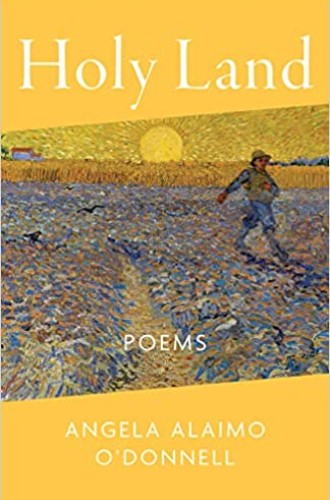Standing on holy ground
Angela Alaimo O’Donnell’s poems carry the vision that all land, all people, and all moments are sacred.
Angela Alaimo O’Donnell’s tenth book of poems begins with two epigraphs: “Remove your sandals from your feet, for the place on which you are standing is holy ground” (Exod. 3:5) and “The Holy Land is everywhere” (Black Elk). These two lines express perfectly the theme of the book. Although each poem stands on its own, a consistent vision is carried through them all: the vision that all is holy—all lands, all people, all moments.
The book’s opening poems take place in the Holy Land, the land of Jesus’ life. But as the settings move elsewhere—to Ireland, to O’Donnell’s family, to the skies and winter weather, to literary figures, and to the US-Mexico border—all reveal their unique holiness. In fact, many of the poems’ titles evoke particular holy lands: “The Land of Daughterhood,” “The Land of Extravagance,” “The Land of Birth,” “The Land of Forgetting,” and many more.
Take “The Land of Long Marriage,” an homage to the care O’Donnell’s sister gives her diabetic husband. After detailing the care, the poem ends:
they live, man and wife, as if this life
were worth the courage. They walk the knife
edge of the grief that’s coming. This is no hoax,
no dress rehearsal. This is all they get,
making the most of what isn’t over yet
But O’Donnell’s vision of universal holiness doesn’t preclude fun. Delight, after all, is just as holy as difficulty. So “The Land of All Souls,” for instance, pictures the souls on All Souls’ Day as ghosts haunting the speaker’s home—“here with us at the breakfast table / . . . buttering their toast, / the knives heavy in their airy hands.”
This poem, like many in the book, is 14 lines, with a few end rhymes here and there. One of O’Donnell’s delights throughout is playing with the sonnet form. A few poems are true sonnets, in iambic pentameter with the traditional rhyme scheme. But many more take liberties with meter or rhyme, though they keep the closing couplet. Take “Postcard from Purgatory #1,” composed as a comic letter to the speaker’s mother. It describes an imagined life in Dante’s Purgatorio, and it ends like this:
Gentle devils cheer as we
fail and try, time & time again, to climb
steep hills of garbage, compost of our sin.
We get to the top and slide down again.
When we run on hot coals, I come in first.
It’s no spring picnic, but I’ve seen worse.
More serious in tone but still loosening up the sonnet form is Terre et Lune, in which the speaker stands with a child looking up at the night sky’s stars and half-moon. Fourteen lines, all but one in iambic pentameter; a few end rhymes but in no pattern until the lovely closing couplet, which follows “We flash our SOS to no one there”—
except the moon, earth’s companionable ghost,
the world’s blessed and broken communion host.
For the final section of Holy Land, called “Border Songs,” O’Donnell has chosen a very different poetic form: the triolet. I confess I had to look up what a triolet is. It’s a poem of eight lines, rhyming abaaabab, with the first line recurring as the fourth and seventh and the second line as the eighth. This form is just right for O’Donnell’s 15 border songs, in which most of the speakers are immigrants suffering at the US-Mexico border. “Border Song #9” shows how well the triolet form works for these speakers:
I am a father, though I have no son.
They wrested him away and now he’s gone.
I had no knife, no passport, no gun.
I am a father, though I have no son.
They took away my moon. They took my sun.
All I do is weep from dusk to dawn.
I am a father, though I have no son.
They wrested him away and now he’s gone.
This father is, naturally, obsessed by his plight: that the government has taken away his son. So it’s natural that he would keep repeating his tragic position. Speakers of other “Border Songs” similarly cry out their emotional pain repeatedly: “My child sleeps in a cage and yet he sings” (#4); “I dream of corn tortillas and black beans” (#5); “I lost my country. Now I’ve lost my mind” (#7); “I don’t know what it means to be alone” (#11).
These poems are the perfect ending to Holy Land. They demonstrate that while our border is a place where holiness has been stolen by the government, the immigrants held there are holy. They, the singers of these songs, are the holy land.





